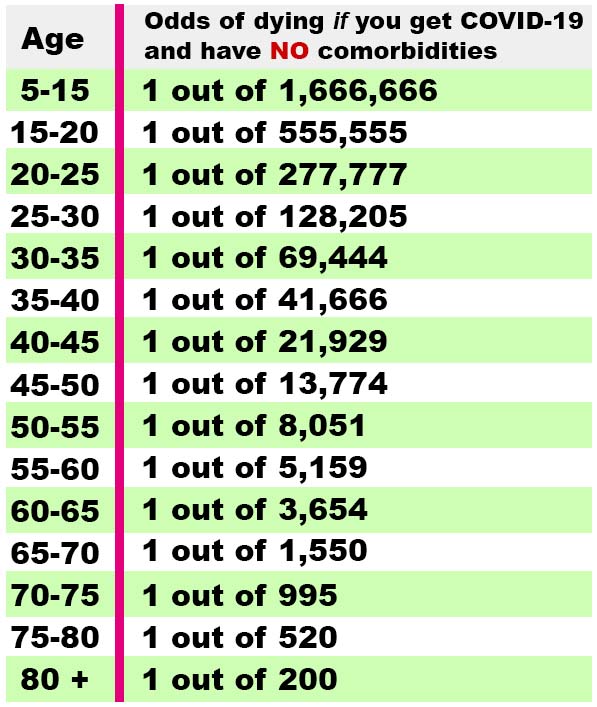Assessing your death rate before getting vaccinated, especially if you have no underlying health conditions
Vaccines are usually tested for 4 to 5 years before getting FDA approval. The COVID-19 vaccines are being approved under emergency use authorization. So, before getting injected with a COVID-19 vaccine that has not been adequately tested and is not FDA approved, it might make sense to calculate your infection fatality rate -- That's the odds of you dying if you catch the virus. You want to weigh the risks (including the unknown long-term risks) associated with getting the vaccine versus the odds of dying from the virus if you catch it.
If we simply look at the COVID-19 rates [1, 2, 3] of death by age, this is what we have...

However, the above stats lump healthy and unhealthy people together. If you aren't aren't overweight, aren't diabetic, don't have high blood pressure or other serious medical conditions, it would appear that you should not be looking at the above bloated stats to assess your risk. Your odds of dying are less than the above chart indicates.
How much less? If we calculate strictly based on CDC data, it would appear to be much less!
According to the CDC's data from February 2, 2020, to August 22, 2020, only 6 percent of the 161,392 reported COVID deaths were listed as COVID-19 alone. This is a very significant stat! If you in fact have no comorbidities, then your statistical risk of dying is much lower.

Again, for comparison...
Age 5 - 14 -- Odds of dying for everyone in age group: 0.001 or 1 out of 100,000
Age 5 - 14 -- Odds of dying if no comorbidities: 0.00006 or 1 out of 1,666,666
Age 15 - 19 -- Odds of dying for everyone in age group: 0.003 or 1 out of 33,333
Age 15 - 19 -- Odds of dying if no comorbidities: 0.00018 or 1 out of 555,555
Age 20 - 24 -- Odds of dying for everyone in age group: 0.006 or 1 out of 16,666
Age 20 - 24 -- Odds of dying if no comorbidities: 0.00036 or 1 out of 277,777
Age 25 - 29 -- Odds of dying for everyone in age group: 0.013 or 1 out of 7,692
Age 25 - 29 -- Odds of dying if no comorbidities: 0.00078 or 1 out of 128,205
Age 30 - 34 -- Odds of dying for everyone in age group: 0.024 or 1 out of 4,166
Age 30 - 34 -- Odds of dying if no comorbidities: 0.00144 or 1 out of 69,444
Age 35 - 39 -- Odds of dying for everyone in age group: 0.040 or 1 out of 2,500
Age 35 - 39 -- Odds of dying if no comorbidities: 0.0024 or 1 out of 41,666
Age 40 - 44 -- Odds of dying for everyone in age group: 0.075 or 1 out of 1,315
Age 40 - 44 -- Odds of dying if no comorbidities: 0.00456 or 1 out of 21,929
Age 45 - 49 -- Odds of dying for everyone in age group: 0.121 or 1 out of 826
Age 45 - 49 -- Odds of dying if no comorbidities: 0.00726 or 1 out of 13,774
Age 50 - 54 -- Odds of dying for everyone in age group: 0.207 or 1 out of 483
Age 50 - 54 -- Odds of dying if no comorbidities: 0.01242 or 1 out of 8,051
Age 55 - 59 -- Odds of dying for everyone in age group: 0.323 or 1 out of 309.59
Age 55 - 59 -- Odds of dying if no comorbidities: 0.01938 or 1 out of 5,159
Age 60 - 64 -- Odds of dying for everyone in age group: 0.456 or 1 out of 219.3
Age 60 - 64 -- Odds of dying if no comorbidities: 0.02736 or 1 out of 3,654
Age 65 - 69 -- Odds of dying for everyone in age group: 1.075 or 1 out of 93
Age 65 - 69 -- Odds of dying if no comorbidities: 0.0645 or 1 out of 1,550
Age 70 - 74 -- Odds of dying for everyone in age group: 1.674 or 1 out of 59.73
Age 70 - 74 -- Odds of dying if no comorbidities: 0.10044 or 1 out of 995
Age 75 - 79 -- Odds of dying for everyone in age group: 3.203 or 1 out of 31.22
Age 75 - 79 -- Odds of dying if no comorbidities: 0.19218 or 1 out of 520
Age 80 plus -- Odds of dying for everyone in age group: 8.292 or 1 out of 12.06
Age 80 plus -- Odds of dying if no comorbidities: 0.49752 or 1 out of 200
But wait! It gets even better! Remember that the CDC only tracked data until August 22, 2020. Since then, treatments have improved. According to a study, monoclonal antibody treatment has reduced the risk of hospitalization and death by 70%. Furthermore, if treated very early (soon after developing symptoms) with low dose hydroxychloroquine and zinc, this further improves outcomes. Many doctors have not done their research regarding hydroxychloroquine and refuse to prescribe it. This has increased death rates.
NOTES:
Keep in mind that it is critical to know whether or not you have comorbidities. Fortunately you can get tested for diabetes, cancer, high blood pressure, etc.
Also, we are assuming the 6% rate of deaths in people with no comorbidities is consistent across all age groups.
Also, if you have just one comorbidity, it might be unfair to lump you in with all people with multiple comorbidities who died. The CDC's group of 'patients who died with comorbidities' averaged 2.6 comorbidities.
Peer review our findings using OpenOffice.org free software. Then download this spreadsheet.
Back to news